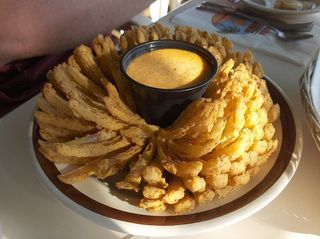Study Finds Why We Crave Chips & Fries

It's hard to eat just one potato chip, and a new study may explain why.
Fatty foods like chips and fries trigger the body to produce chemicals much like those found in marijuana, researchers report today (July 4) in the journal Proceedings of the National Academy of Sciences (PNAS). These chemicals, called "endocannabinoids," are part of a cycle that keeps you coming back for just one more bite of cheese fries, the study found.
"This is the first demonstration that endocannabinoid signaling in the gut plays an important role in regulating fat intake," study researcher Daniele Piomelli, a professor of pharmacology at the University of California, Irvine, said in a statement.
Homemade marijuana chemicals
The study found that fat in the gut triggers the release of endocannabinoids in the brain, but the gray stuff between your ears isn't the only organ that makes natural marijuana-like chemicals. Human skin also makes the stuff. Skin cannabinoids may play the same role for us as they do for pot plants: Oily protection from the wind and sun.
Endocannabinoids are also known to influence appetite and the sense of taste, according to a 2009 study in PNAS, which explains the munchies people get when they smoke marijuana. [Read: 8 Reasons Our Waistlines Are Expanding]
In the new study, Piomelli and his colleagues fitted rats with tubes that would drain the contents of their stomachs as they ate or drank. These stomach tubes allowed the researchers to tell whether fat was acting on the tongue, in which case they would see an endocannabinoid release even with the tubes implanted, or in the gut, in which case they wouldn't see the effect.
Sign up for the Live Science daily newsletter now
Get the world’s most fascinating discoveries delivered straight to your inbox.
The rats got to sip on a health shake (vanilla Ensure), a sugar solution, a protein-rich liquid called peptone, or a high-fat beverage made of corn oil. Then researchers anesthetized and dissected the rats, rapidly freezing their organs for analysis.
For the love of fat
Tasting sugars and proteins didn't affect the release of the body's natural marijuana chemicals, the researchers found. But supping on fat did. The results showed that fat on the tongue triggers a signal to the brain, which then relays a message down to the gut via a nerve bundle called the vagus nerve. This message commands the production of endocannabinoids in the gut, which in turn drives a cascade of other signals all pushing the same message: Eat, eat, eat!
This message would have been helpful in the evolutionary history of mammals, Piomelli said. Fats are crucial to survival, and they were once hard to come by in the mammalian diet. But in today's world, where a convenience store full of junk food sits on every corner, our evolutionary love of fat easily backfires.
The findings suggest that by blocking the reception of endocannabinoid signals, medical researchers might be able to break the cycle that drives people to overeat fatty food. Blocking endocannabinoid receptors in the brain can cause anxiety and depression, Piomelli said, but a drug designed to target the gut might not trigger those negative side effects.
You can follow LiveScience senior writer Stephanie Pappas on Twitter @sipappas. Follow LiveScience for the latest in science news and discoveries on Twitter @livescience and on Facebook.

Stephanie Pappas is a contributing writer for Live Science, covering topics ranging from geoscience to archaeology to the human brain and behavior. She was previously a senior writer for Live Science but is now a freelancer based in Denver, Colorado, and regularly contributes to Scientific American and The Monitor, the monthly magazine of the American Psychological Association. Stephanie received a bachelor's degree in psychology from the University of South Carolina and a graduate certificate in science communication from the University of California, Santa Cruz.
